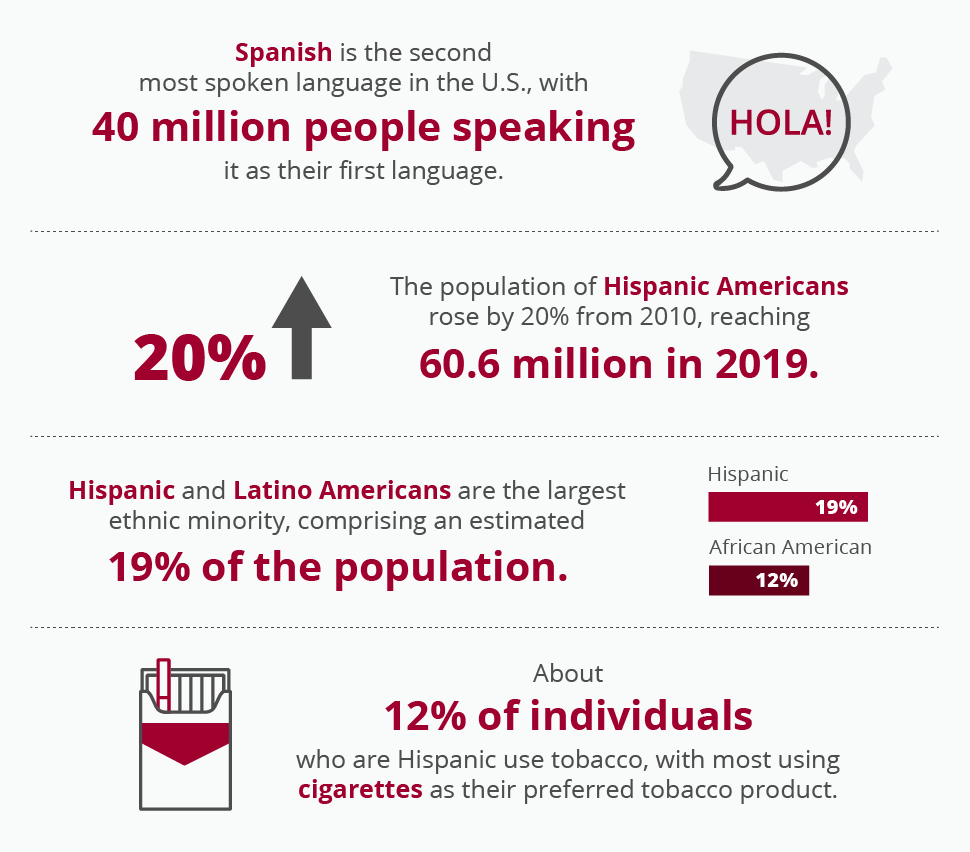For many employers and health plans, offering support to quit smoking in Spanish is not a nice-to-have. It’s a must have, and for good reason.
But Spanish quit support doesn’t mean a provider can simply take cessation resources and translate them. Other factors such as culture play an important role, too.
For example, people who are Hispanic/Latino may be more likely to smoke intermittently or smoke less than 10 cigarettes per day. As a tobacco treatment specialist, I know different cessation strategies may be helpful for individuals with these smoking patterns.
Expertise to help individuals quit smoking in Spanish
A key aspect of my work as a tobacco treatment specialist has been working with community-based organizations to leverage resources that are culturally sensitive and effective.
That led me to work with Truth Initiative and develop Spanish-language content and experiences for the EX Program.
Based on my 10+ years working with tobacco addiction, here are some of the most important aspects I see to helping Spanish speakers successfully quit:
- Language differences aren’t just about words. When working with those who need Spanish materials, it’s crucial to engage them on multiple levels. This includes:
- Literacy level
- Cultural nuances
- Dialects
- Language proficiency
In many cases, a word-for-word translation may use an incorrect term or sound too formal. That can cause a reader to feel disengaged. Using words that give materials a conversational tone draws a reader in, and most important, engages them to find out more.
- Social determinants of health need to be considered. Another aspect to tobacco cessation that may play a role for Latinx individuals and families are issues like financial stability, housing, and transportation. These may not seem to be connected to tobacco use directly, but they can play a major role for healthcare access to quit-tobacco support.
Social determinants of health also involve how someone’s community can impact their behaviors, and that also needs to be addressed. Addiction affects an entire family, which is why it’s important to offer support to everyone who might be affected within that family.
- Support goes beyond written materials. The fact is that each of us have multiple dimensions to our personalities. For me, I’m originally from Colombia, I have experience with tobacco treatment, I’m Latina and speak Spanish, and I have a certain set of literacy skills. But that’s only a few aspects of who I am.
Seeing people who want to quit smoking in Spanish means seeing them for more than their primary language; it entails respect and appreciation for every dimension of who they are. Like everyone, they want to feel heard, understood, and welcomed into a program.
It’s not surprising, for example, that research shows about 8 in 10 (81%) Hispanic adults who are Spanish language dominant prefer to see a Spanish-speaking healthcare provider.
Helping Hispanics and Latinos live tobacco free
We know more than half of Hispanic/Latino smokers make a quit attempt each year. But we also know Hispanic/Latino smokers have lower odds of receiving quitting advice from a health professional compared to white smokers.
Together, we can make a positive impact on access to quit support for these communities.
When health plans and employers offer the EX Program, they provide quit support in Spanish through tobacco treatment specialists, text messages, and relevant content. And our support is designed in ways that addresses cultural nuances, language proficiency, and technology preferences.
By taking this deeper approach, we ensure Spanish speakers and their families have what they need to quit tobacco for good.
To learn more about the EX Program, I encourage you to visit the Program overview page.
Sources: https://www.census.gov/programs-surveys/acs/news/data-releases.2020.html https://www.pewresearch.org/fact-tank/2020/07/07/u-s-hispanic-population-surpassed-60-million-in-2019-but-growth-has-slowed/ https://www.census.gov/library/stories/2021/08/2020-united-states-population-more-racially-ethnically-diverse-than-2010.html https://www.cdc.gov/mmwr/volumes/71/wr/mm7111a1.htm






